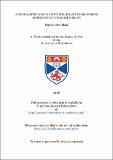Files in this item
A pluralistic solution to the relationalism versus representationalism debate
Item metadata
| dc.contributor.advisor | Prosser, Simon | |
| dc.contributor.advisor | Wheeler, Michael | |
| dc.contributor.author | Black, Paul Andrew | |
| dc.coverage.spatial | 258 p. | en_US |
| dc.date.accessioned | 2018-08-24T15:24:27Z | |
| dc.date.available | 2018-08-24T15:24:27Z | |
| dc.date.issued | 2018-12-07 | |
| dc.identifier.uri | https://hdl.handle.net/10023/15877 | |
| dc.description.abstract | A great deal of philosophy of perception literature has been concerned with determining the fundamental philosophical account of perception. The overwhelming majority of contemporary work in this area has advocated for either a relational view of perception (broadly known as relationalism) or a representational view of perception (broadly known as representationalism). Each of these views is argued by its proponents to constitute the fundamental philosophical account of perception. These arguments are often framed in a manner suggesting that relationalism and representationalism are incompatible with one another on the grounds that if one theory explains all that we would like a philosophical theory of perception to explain, then the other theory is at best screened off as explanatorily redundant. This is known as a screening off argument, and has been utilised by both sides of the relationalism versus representationalism debate. The aim of this thesis is to demonstrate that both the utilisation of this argument in the philosophy of perception, as well as the explanatory methodology underpinning this utilisation, are misguided. This is accomplished by proposing instead that a methodology called explanatory pluralism, which holds that the best explanation of a given phenomenon is determined by what it is about that phenomenon one wishes to understand, should be applied to the debate in question. Once this plausible methodology is applied, I argue, instances that appeared to settle the relationalism versus representationalism debate decisively in favour of one view or the other instead become instances that shape the contours of a view according to which relationalism and representationalism are in fact compatible. I identify and argue for such instances, using them to support the conclusion that relationalism and representationalism are complementary explanations of perception and are, therefore, compatible. | en_US |
| dc.language.iso | en | en_US |
| dc.publisher | University of St Andrews | |
| dc.rights | Attribution-NonCommercial-NoDerivatives 4.0 International | * |
| dc.rights.uri | http://creativecommons.org/licenses/by-nc-nd/4.0/ | * |
| dc.subject | Perception | en_US |
| dc.subject | Relational | en_US |
| dc.subject | Representational | en_US |
| dc.subject | Pluralism | en_US |
| dc.subject | Philosophy | en_US |
| dc.subject.lcc | B828.45B6 | |
| dc.subject.lcsh | Perception (Philosophy) | en |
| dc.subject.lcsh | Relation (Philosophy) | en |
| dc.subject.lcsh | Representation (Philosophy) | en |
| dc.title | A pluralistic solution to the relationalism versus representationalism debate | en_US |
| dc.type | Thesis | en_US |
| dc.contributor.sponsor | St Andrews and Stirling Graduate Programme in Philosophy (SASP) | en_US |
| dc.type.qualificationlevel | Doctoral | en_US |
| dc.type.qualificationname | PhD Doctor of Philosophy | en_US |
| dc.publisher.institution | The University of St Andrews | en_US |
| dc.publisher.department | Stirling University | en_US |
The following licence files are associated with this item:
This item appears in the following Collection(s)
Except where otherwise noted within the work, this item's licence for re-use is described as Attribution-NonCommercial-NoDerivatives 4.0 International
Items in the St Andrews Research Repository are protected by copyright, with all rights reserved, unless otherwise indicated.


